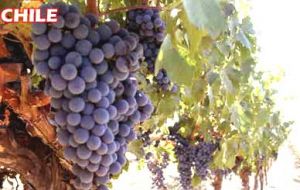MercoPress. South Atlantic News Agency
Chile wine production increases in volume and quality
 Over a billion litres of wine and 85% with declaration of origin
Over a billion litres of wine and 85% with declaration of origin The Chilean wine industry produced more wine, and of better quality, in 2009 than any previous year, according to a recent report by the Office of Agriculture and Livestock (SAG).
Chilean winemakers reported just over a billion litres of wine produced between July 1, 2008 and June 30, 2009, an increase of 14.5% over the previous year.
The 2009 production also saw a sharp rise in wines that were classified as “denominación de origen” (DO). These are wines that - by following strict quality guidelines - allow winemakers to label their wares as coming from a specific region.
This year 85.9% of all wine produced was classified as DO, up from last year’s 79.6%.
Of the DO wines, Cabernet Sauvignon, a dark, red wine, led the pack with 39.1% of total production, or almost 335 million litres. Sauvignon blanc, a dry white wine, was next with 14.3%, nearly 122.4 million litres. Merlot, Chardonnay, and Carmenere followed with 13.3, 11.2 and 8.7% of total production, respectively.
The DO classification system works in a similar vein to the US system of American Viticultural Areas (AVAs), wherein a winemaker is limited as to the geographical claims he or she can make on the wine label. Wines that do announce their origin must have satisfied certain conditions to count as DO wines, and are typically of higher quality. Wines that are “without declaration of origin” are lower quality, with “table wines” coming in last.
The 2009 batch of wine overwhelmingly shifted to the higher-quality level, with “sin-DO” and table wine seeing losses of 7.4 and 41.7%, respectively, compared to last year.
The improving economy helped fuel the increase in high-quality wine, said Elias Obreque Slier, a professor of enology, the science of winemaking, at the Universidad de Chile.
Non-DO wine and table wine held market shares of 19.2 and 6.3% in 2008, compared to 13.4 and 2.96 percents in 2009. Slier added that he thinks the DO rating system is not strict enough, as it is currently less strict than other major wine-producing countries, and expects the levels of DO wines to continue to rise.
“Chile needs to produce quality wines,” he said. “I think that the businesses have realized that . . . in order to reach other markets and rise above the conception that Chile produces good, but cheap, wine”.
By Daniel Zarchy - Santiago Times




Top Comments
Disclaimer & comment rulesCommenting for this story is now closed.
If you have a Facebook account, become a fan and comment on our Facebook Page!